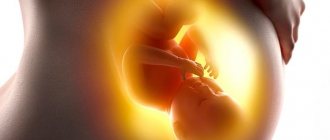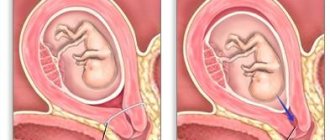Notifications
Marina, gave birth at 33 years old. Now my son is 3 years old
I didn’t want to give birth early, at 20–25 years old, I wanted freedom and felt almost like a child. I planned to give birth at 27–28, but the child “didn’t work out.” We spent several years visiting doctors, then we reconciled ourselves and decided to live together. But I unexpectedly became pregnant.
When I found out about this, I was shocked. Just a shock. It was spring, I was preparing for summer, working out in the gym and signing up for a course of lipolytics (injections for weight loss. - NGS.NEWS). Pregnancy was not even in my thoughts. And if I hadn’t experienced it myself, I would never have believed that an adult aunt for 30+ years does not understand that she is pregnant, right up until the eighth week. I saw a heart on the ultrasound and the first emotions: “Ah-ah, there’s an Alien in me!”
Before the birth of the child, there were no special travels or career heights; we went on vacation once a year; my career was a low-ranking manager. We just felt very good together, very much. We were easy-going, the work took a lot of time, but if free time appeared, it was great. For example, going for a weekend to another city, to Altai or somewhere else is easy. Rushing out after work to admire the sunset or watch the sunrise is the same. There was a lot of work and a lot of romance, and somehow there was no place for the child in life.
I left work two weeks before giving birth, the clients were loyal and positive, my husband tolerated the difficulties of my character, they gave up seats in transport. I expected negativity from the doctors, but I didn’t receive it - they were indifferent. Moreover, there are many such 30-year-old women in labor, but more often than not with their firstborns. The pregnancy was very easy, although there was a very long toxicosis, but somehow I didn’t suffer much. The only thing is that I ran away from the negotiations with an attack of nausea, well, the clients were understanding.
Life after the birth of a child changed, and very much. The opportunity to satisfy one’s “wants” has disappeared, both materially and morally. The child was born in 2014, the first most difficult year was in 2015 - just a crisis for my husband’s and my professions.
It was also difficult to realize that you were attached to a child. Fully. You can’t even just go to the toilet or shower when you need to. Not to mention the romance. The birth of a child has a negative impact on relationships! It is a lie that a child can strengthen anything! All unresolved problems become problems. Together you get used to a certain freedom, to a routine, but the child changes life 180 degrees.
The attitude of those around me has also changed: not in terms of age, but in terms of the fact that a month ago I was a reasonable woman, a specialist, and now I am a stupid young mother who does everything wrong with her child. This really unsettles me.
The age difference with my child does not bother me. So what if at school among girls 26-27 years old I will be 40, I don’t consider myself a grandmother. Everything happened when it was supposed to happen. Maybe age is a bit of a concern in terms of health: after all, sleepless nights at 20 and at 30 are different things. When I’m 50, my son will graduate from school. But again, I feel more confident than at 25. And having a baby is an incentive to take care of yourself and your health.
Opinion: Deputy Chief Physician for Medical Affairs of Maternity Hospital No. 5 Irina Rostovtseva.
There is nothing wrong with giving birth after 30.
We live in the times we live in: it dictates its own rules. It is believed that from 22 to 30 is the best physiological age for childbirth, but now we are treating women of different ages, and there are many of those who are already over 30.
We see women 30–34 years old who give birth naturally. The most important thing here is to get examined and prepare yourself for childbirth. And complications can occur at 22 and at 35.
Each woman should give birth to 2 children so that the country's population only grows. But this can be done even after 30 years.
How to get 150 thousand for your first child in the Tyumen region
Residents of the Tyumen region will receive regional maternity capital in the amount of 150 thousand rubles upon the birth of their first child. The new law will come into force in the new year. How to receive payments - told Irina Ozhogina , Deputy Director of the Department of Social Development of the Tyumen Region.
Women who gave birth to their first child starting January 1, 2020 are eligible for payments. Men - upon the death of their mother, deprivation of her parental rights, or the commission of a crime against minors.
The requirement for a woman is that she must live in the region for at least five years. The residence rule does not apply to students. For them, proof of residence is full-time study.
To receive payments, you need to provide a passport and bank details for transfer. This can be done through the portal of government services or social protection institutions.
In addition, from January 1, 2020, payments for the 3rd or subsequent child will increase. However, he may be born earlier. The amount of regional capital will depend on the date of circulation: before or after the New Year. A woman has the right to apply for support within three years after the birth of her child.
Photo: mchildren.ru
In the Voronezh region, a woman gave birth to a child who did not develop in the uterus
Little Nastya was born on Epiphany Eve. While the baby is sleeping, Evgenia’s mother tells what a miracle the birth of her third child was for her.
“It was hard, hard and scary. You think in your head that the case is truly unique, you barely survived,” says Evgenia Baturina.
Evgenia did not know that she was pregnant. When I felt severe pain in my stomach, I went to the antenatal clinic at my place of residence, in Boguchar. The doctor diagnosed pregnancy, and, to the surprise of the expectant mother, it was 34 weeks. The woman was admitted to the hospital, but the pain began to intensify. Doctors also could not determine the position of the fetus. And they decided to urgently hospitalize the pregnant woman at the perinatal center in Voronezh.
“She was transferred to us with a different diagnosis and impaired blood flow in the fetus. We didn't prepare at all. We learned that she had such a pregnancy during the abdominal dissection,” said Galina Nikonova, head of the remote obstetric center at the Voronezh Regional Hospital.
What the doctors saw during the operation was shocking. The almost fully formed fetus was not inside the uterus, but outside. The placenta attached to the appendages without damaging vital organs. All this time the child developed normally. The emergency operation lasted an hour and a half - not much for such a complex case, and the doctors performed it flawlessly.
The baby doesn’t yet know how unique a child she is. But now she is already receiving the most ordinary care, like all other babies in the perinatal center.
Two kilograms one hundred grams - the baby was born at the 38th week of pregnancy. Five days of intensive care monitoring with light respiratory support, then another week in the therapy department, and it became clear to the doctors: the child could be transferred to a ward with the mother. Today, doctors no longer have concerns about their health.
“According to statistics, 50% of such children are definitely born with some kind of anomaly. The fact that a practically full-term baby was born here, without any violations, will probably be an isolated case in world practice,” said Tatyana Gushchina, head of the obstetric department of the perinatal center of the city of Voronezh.
Only 17 similar cases have been described in the world when healthy babies were born. After all, an ectopic pregnancy is dangerous for both the mother and the child.
“Fertilization does not occur in the uterus. It occurs in the fallopian tube. For some reason, the fertilized egg fell out of the tube and remained to live where it was not supposed to,” says Galina Nikonova, head of the remote obstetric center at the Voronezh Regional Hospital.
“A unique rare case. The fertilized egg can attach to the liver, spleen, ovaries, intestines, and peritoneum. And, of course, childbirth is very dangerous, since there is a risk of large blood loss,” says the head of the Institute of Obstetrics named after. Kulakova Roman Shmakov.
As a result of the operation, doctors were able to preserve not only the life and health of the child, but also the reproductive functions of the mother. They are now being prepared for discharge. At home in Boguchar, baby Nastenka has a large family waiting for her: Evgenia has a son, an adult daughter, and even a grandson.
Early child.
From the point of view of gynecologists and obstetricians, childbirth at the age of 18-20 is quite welcome. A young and healthy body that has not yet had time to absorb tons of “useful ecology”, has not yet lost its nerves, and the chance of giving birth to a child with genetic disorders, such as Down syndrome, is 1 in 1562. After childbirth, the mother’s young body easily and quickly recovers, excess weight disappears instantly, stretch marks on elastic young skin are also rare.
From the point of view of psychologists, becoming a mother at 18 is a huge risk. Young mothers, still essentially remaining children themselves, cannot give proper upbringing to their child. On the other hand, young mothers become smart very quickly and by the age of 25-27 they are a charming mother and a smart first-grader child.
For some reason, in our society it is customary to measure the mother’s age by the child’s first grade. They often ask “how old will you be when you take him to first grade?” It turns out 25-27 years old, quite an excellent age for yourself, when you already have a head on your shoulders and still have youth in its prime and you can fool around with your child and have fun. Amazing.
From the point of view of social adaptation, young mothers are the most difficult topic. No education, no job, no stable income, no home of my own. And very often young mothers never receive higher education, do not make a career, and in general, in terms of social adaptation in society, everything leaves much to be desired.
If we consider an “early” child from the point of view of ordinary life, then young mothers react more simply and easily to all the pleasant and unpleasant moments that happen in their lives. They treat childhood illnesses more easily and, although they can terrify a young mother (because there is no life experience), they are also easier and simpler to solve (because there is no sad and depressing life experience). And if the baby is standing on his ears and jumping around the apartment like a monkey, he has the strength and mood to survive all this chaos.
On the other hand, a mother is a responsibility, and while unmarried friends can easily party in nightclubs and meet boys, a young mother remains a mother first and foremost. With all the ensuing consequences. You need to put an end to a reckless life, but it is at the age of 18-20 that the most beautiful and unforgettable moments in life occur - student parties, dates, breakups, hiking and self-discovery.
Pregnancy and childbirth at 33 years old: features of preparation
It is believed that the ideal period for having a first child is between 18 and 28 years old. In fact, a woman who leads a healthy lifestyle has a very good chance of giving birth to a healthy child without problems even after 30.
If you have planned your first pregnancy and childbirth at the age of 33 , pay attention to the preparatory stage:
- It is highly advisable to get rid of all bad habits a few months before conception. Moreover, we are talking not only about smoking and alcohol, but also about lack of sleep, irregular and irrational nutrition.
- Introduce physical activity into practice, paying special attention to the abdominal and back muscles.
- Talk to your doctor about taking folic acid before you conceive.
- Go through the necessary examinations with an endocrinologist, cardiologist, gynecologist, and also get tested for the presence of TORCH infections and the risk of possible genetic abnormalities.
By this age, a woman’s life has most often returned to its usual rhythm, so be prepared that pregnancy and childbirth at 33 will bring significant changes.
Remember one more thing - the likelihood of having twins after 30 years of age increases significantly.
Second pregnancy and childbirth at 33: what you need to know
For women who are planning a second pregnancy and childbirth at 33 years old, pregnancy and the birth of a baby can be much easier. There are two reasons here:
- Readiness of the birth canal.
- Skills and knowledge acquired during the first pregnancy.
It should be taken into account that from a medical point of view, the ideal period between the first and second births is 2-3 years. It is during this time that the body has time to fully recover and prepare to bear the next child. Making a smaller time gap is undesirable, as this can cause its own complications - anemia, risks of premature termination of pregnancy, and more.
If the first pregnancy passed without complications, you can expect that the second will have the same course. However, you need to first undergo examinations and pay attention to the prevention of diseases of the unborn baby - consultations with doctors will be necessary.
Chronic diseases and pregnancy
With age, a person (it does not matter whether it is a woman or a man) acquires various chronic diseases. Usually these are diseases associated with the functioning of the digestive organs, the cardiovascular system, and the mechanisms of formation of connective and articular tissue. In addition, there is a general decrease in immunity, tone, and age-related weakening of the body. Pregnancy is a difficult process for the female body, during which it is subjected to increased stress. This entails certain risks for both the expectant mother and the baby: premature birth, low weight, hypoxia. All this can cause underdevelopment of the fetus and the appearance of pathologies in the child’s anatomical structure and internal organs. So it turns out that those who do not recommend women to give birth after 35 are right? Yes. especially when it comes to your first pregnancy. A child born at 35 is more likely to have genetic pathologies and hereditary diseases than a child born at 20. In addition, as parents age, the risk of a child’s predisposition to cancer and mental disorders, as well as the presence of congenital pathologies of internal organs and weakened immunity, increases.











